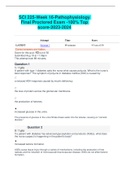SCI 225 Pathophysiology (SCI225)
Nightingale College
Page 2 out of 30 results
Sort by
SCI 225-Week 16-Pathophysiology Final Proctored Exam -100% Top score-2023-2024
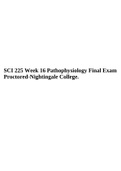
-
SCI 225 Week 16 Pathophysiology Final Exam Proctored-Nightingale College.
- Exam (elaborations) • 26 pages • 2022
-
- $10.99
- 2x sold
- + learn more
SCI 225 Week 16 Pathophysiology Final Exam Proctored-Nightingale College. Question 1 1 / 1 pts A patient with type 1 diabetes asks the nurse what causes polyuria. What is the nurse’s best response? The symptom of polyuria in diabetes mellitus (DM) is caused by: a reduced ADH response caused by insulin deficiency. the loss of protein across the glomerular membrane. the production of ketones. increased glucose in the urine. The presence of glucose in the urine filtrate d...
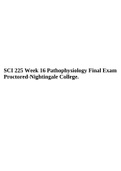
-
SCI 225 Week 16 Pathophysiology Final Exam Proctored-Nightingale College.
- Exam (elaborations) • 26 pages • 2022
-
- $6.99
- + learn more
SCI 225 Week 16 Pathophysiology Final Exam Proctored-Nightingale College. Question 1 1 / 1 pts A patient with type 1 diabetes asks the nurse what causes polyuria. What is the nurse’s best response? The symptom of polyuria in diabetes mellitus (DM) is caused by: a reduced ADH response caused by insulin deficiency. the loss of protein across the glomerular membrane. the production of ketones. increased glucose in the urine. The presence of glucose in the urine filtrate dr...
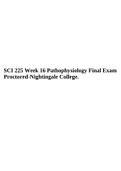
-
SCI 225 Pathophysiology Week 16 Final Exam Proctored-Nightingale College.
- Exam (elaborations) • 26 pages • 2022
-
- $9.99
- + learn more
SCI 225 Pathophysiology Week 16 Final Exam Proctored-Nightingale College. Question 1 1 / 1 pts A patient with type 1 diabetes asks the nurse what causes polyuria. What is the nurse’s best response? The symptom of polyuria in diabetes mellitus (DM) is caused by: a reduced ADH response caused by insulin deficiency. the loss of protein across the glomerular membrane. the production of ketones. increased glucose in the urine. The presence of glucose in the urine filtrate d...
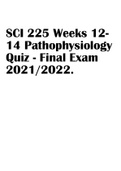
-
SCI 225 Week 2 and 3 Pathophysiology Quiz | SCI 225 Weeks 9-11 Pathophysiology Quiz 2021/2022 | SCI 225 Weeks 12- 14 Pathophysiology Quiz - Final Exam 2021/2022 and SCI 225 Week 16 Pathophysiology Final Exam (Proctored) 2021.
- Package deal • 4 items • 2022
-
- $35.49
- 1x sold
- + learn more
SCI 225 Week 2 and 3 Pathophysiology Quiz | SCI 225 Weeks 9-11 Pathophysiology Quiz 2021/2022 | SCI 225 Weeks 12- 14 Pathophysiology Quiz - Final Exam 2021/2022 and SCI 225 Week 16 Pathophysiology Final Exam (Proctored) 2021.
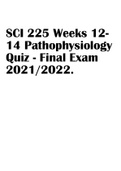
-
SCI 225 Week 2 and 3 Pathophysiology Quiz | SCI 225 Weeks 9-11 Pathophysiology Quiz 2021/2022 | SCI 225 Weeks 12- 14 Quiz & SCI 225 Week 16 Final Exam.
- Package deal • 4 items • 2022
-
- $20.49
- + learn more
SCI 225 Week 2 and 3 Pathophysiology Quiz | SCI 225 Weeks 9-11 Pathophysiology Quiz 2021/2022 | SCI 225 Weeks 12- 14 Quiz & SCI 225 Week 16 Final Exam.

-
SCI 225 Weeks 12- 14 Pathophysiology Quiz | Final Exam 2021/2022.
- Exam (elaborations) • 17 pages • 2022
- Available in package deal
-
- $11.49
- + learn more
SCI 225 Weeks 12- 14 Pathophysiology Quiz | Final Exam 2021/2022. Which intervertebral disks should the nurse assess first for herniation? C5-C7 T6-T8 T12-L3 L4-S1 Correct! Because of the loads and strain the lower back endures, the disks of L4-L5 and L5-S1 are the most likely to herniate. Question 2 1 / 1 pts A patient has a saccular aneurysm. What term can the nurse use to describe this type of aneurysm? Fusiform Berry Correct! Saccular aneurysms can be called berry aneurysm...
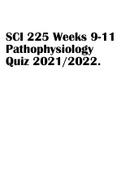
-
SCI 225 Weeks 9-11 Pathophysiology Quiz 2021/2022.
- Exam (elaborations) • 18 pages • 2022
- Available in package deal
-
- $11.49
- + learn more
SCI 225 Weeks 9-11 Pathophysiology Quiz 2021/2022. A patient has heparin-induced thrombocytopenia (HIT). Which condition is a priority to assess? Pulmonary infarction Pulmonary hypertension Pulmonary edema Pulmonary embolism Correct! Venous thrombosis is more common and results in deep venous thrombosis and pulmonary emboli. Question 2 1 / 1 pts Which symptoms should the nurse assess for in a patient with Hodgkin's lymphoma? Headache, visual changes, and hearing loss Night sw...
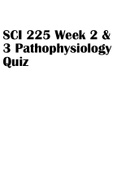
-
SCI 225 Week 2 and 3 Pathophysiology Quiz
- Exam (elaborations) • 17 pages • 2022
- Available in package deal
-
- $11.49
- + learn more
SCI 225 Week 2 and 3 Pathophysiology Quiz. The nurse in the genetics clinic is describing a genetic disease that leads to progressive dementia in middle to later adulthood. To which disease is the nurse most likely referring? Duchenne muscular dystrophy Cystic fibrosis Achondroplasia Huntington disease Correct! Symptoms of Huntington disease, including progressive dementia and uncontrolled limb movements, do not usually manifest until later in life. Question 2 1 / 1 pts If an ovum...
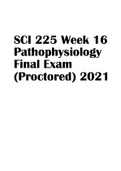
-
SCI 225 Week 16 Pathophysiology Final Exam (Proctored) 2021
- Exam (elaborations) • 26 pages • 2022
- Available in package deal
-
- $10.49
- + learn more
SCI 225 Week 16 Pathophysiology Final Exam (Proctored) 2021 A patient with type 1 diabetes asks the nurse what causes polyuria. What is the nurse’s best response? The symptom of polyuria in diabetes mellitus (DM) is caused by: a reduced ADH response caused by insulin deficiency. the loss of protein across the glomerular membrane. the production of ketones. increased glucose in the urine. The presence of glucose in the urine filtrate draws water into the tubules, causing ...

How did he do that? By selling his study resources on Stuvia. Try it yourself! Discover all about earning on Stuvia

